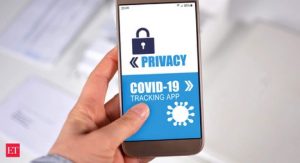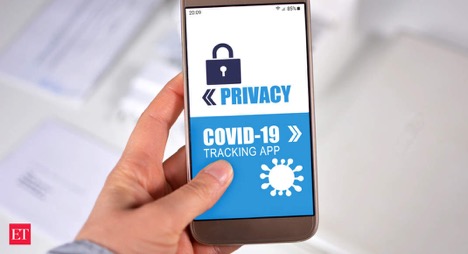By: Christopher Vinson
As COVID-19 continued to spread in the United States throughout the summer months, the conversation shifted towards how to safely reopen universities in the fall. In response, universities implemented a variety of safety measures from social distancing to mandatory mask-wearing. Universities have also been keen to utilize technology to help avoid outbreaks among their student populations. One of the more interesting tools used by colleges and universities are apps that can be used for COVID-19 symptom screening and contact tracing.
These apps are seen by many universities as the key to an effective reopening. Many colleges across the nation have either developed their own apps or are using apps developed by third parties. Rutgers University has taken the step of creating their own apps.[1] The apps allow for students, faculty, and staff to self-screen for COVID-19 symptoms before traveling to campus and allow for effective contact tracing to take place.[2]
Other universities have used contact tracing apps developed using tools from Google and Apple.[3] Stockton University in New Jersey has piloted an app that uses Bluetooth to sense whether someone came into close proximity for a specific period of time with someone that contracted COVID-19.[4] A similar app is being used at the University of Alabama at Birmingham.[5] Their app utilizes the signal strength between smartphones to determine whether someone was within six feet for at least fifteen minutes of someone else who contracted COVID-19.[6]
While undoubtedly innovative, the proliferation of these apps has led to increased concerns over privacy. Countries such as Norway have suspended the use of COVID-19 tracking apps.[7] The app used in Norway uploaded live GPS coordinates of its users to a central server.[8] Uploading information to a central server increases the risk of that information being stolen or reused in the future. Additionally, providing the government with live data of their locations understandably worried citizens. The fear is that it may lead to unintended consequences of surveillance outside of COVID-19 tracking.
Even more pressing are the data privacy concerns. A recent study found that thirty out of fifty contact tracing apps available on Google devices access invasive data such as call history, the phone microphone, and the phone camera.[9] Out of those thirty, only sixteen took the additional step of making that data anonymous.[10]The failure to take even the most basic steps for privacy raises serious concerns regarding an individual’s civil rights.
Certain schools are attempting to combat privacy concerns through other methods of location data collection. At the University of California, Irvine, a group of researchers wanted to calm those concerns through the development of an app that repurposes data already collected by the school.[11] Their system would rely on tracking devices connected to the campus Wi-Fi to determine if social distancing was being adhered to.[12]Collecting data in this manner avoids the need to share personal information, further protecting users.[13]
As mentioned above, other schools are hoping to use Bluetooth to assist in COVID-19 tracking.[14] This is more privacy friendly since this information is stored as anonymized beacons only on a user’s cellphone.[15]Further, this system operates without noting where the individual device is exactly located.[16] However, other schools have opted for tracking student locations in real time.[17] Regardless, many of these apps are a condition of enrollment and place students in a position where they have no choice but to download the apps.
All these methods beg the question of whether the desire to curb the spread of COVID-19 is infringing on certain privacy rights. Schools risk being seen as prioritizing their finances over the privacy of their student body. The intrusion may be justified for now in the name of public health, but what will happen with all this data in the future? The potential for serious civil rights violations exists and may cause more trouble for these schools in the future than the benefit derived from reopening today.
[1] Hayley Slusser, Rutgers Creates Application for Coronavirus Symptom Screening, Contact Tracing, The Daily Targum (Sep. 28, 2020), https://www.dailytargum.com/article/2020/09/rutgers-creates-applications-for-coronavirus-symptom-screening-contact.
[2] Id.
[3] See Natalie Schwartz, Colleges Look to Apps that Screen for Virus Symptoms and Trace Contacts, The Education Dive (Aug. 12, 2020), https://www.educationdive.com/news/colleges-look-to-apps-that-screen-for-virus-symptoms-and-trace-contacts/583387/.
[4] Molly Bilinksi, Stockton University Among Colleges Piloting COVID-19 Exposure-Tracing App, The Press of Atlantic City, (Sep. 24, 2020), https://pressofatlanticcity.com/news/local/stockton-university-among-colleges-piloting-covid-19-exposure-tracing-app/article_b4bd39c7-c063-559a-9942-ed17ba781593.html.
[5] Schwartz, supra note 3.
[6] Id.
[7] See Thomas Brewster, COVID-19 Tracking Apps ‘A Privacy Trash Fire’ as Norway Nixes its Own, Forbes (Jun. 16, 2020, 6:26 AM), https://www.forbes.com/sites/thomasbrewster/2020/06/16/covid-19-tracking-apps-a-privacy-trash-fire-as-norway-nixes-its-own/#6e6ec65341b4.
[8] Id.
[9] See Tanusree Sharma & Masooda Bashir, Use of Apps in the COVID-19 Response and the Loss of Privacy Protection, Nature Med. (May 26, 2020) https://www.nature.com/articles/s41591-020-0928-y#citeas.
[10] Id.
[11] See Schwartz, supra note 3.
[12] See id.
[13] See id.
[14] See Bilinski, supra note 4.
[15] Jeremy Hsu, Contact Tracing Apps Struggle to be Both Effective and Private, IEE Spectrum (Sep. 24, 2020, 10:00 AM),https://spectrum.ieee.org/biomedical/devices/contact-tracing-apps-struggle-to-be-both-effective-and-private; Elisa Miebach, War Between Privacy and Efficiency, Bloomberg Businessweek (Sep 8, 2020, 1:01 AM), https://www.bloomberg.com/news/articles/2020-09-08/coronavirus-pandemic-covid-19-apps-grapple-with-privacy-and-efficiency.
[16] Schwartz, supra note 3.
[17] See id.

Image Source: https://economictimes.indiatimes.com/tech/software/covid-19-tracing-apps-face-privacy-concerns/mired-in-controversies/slideshow/77783271.cms
